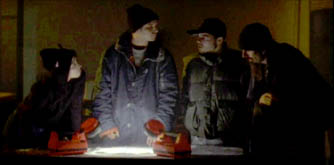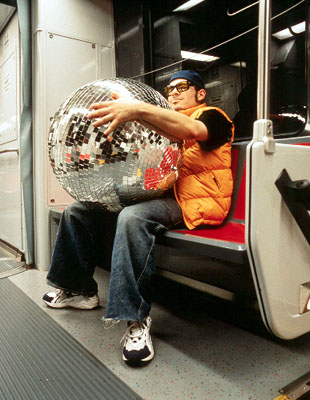

The release of Groove brings about the end to an unofficial trilogy that passed mostly unknown to the public. Groove, Human Traffic, and Better Living Through Circuitry were all techno-themed movies that came out surprisingly close to each other. In a way, techno now has a presence in movie theaters, one that will probably fade into obscurity until better films come along. Human Traffic was the first, a bad British import. Better Living Through Circuitry was a documentary on the rave scene, and now Groove is a story set amidst a rave, and chronicles how the rave affects its participants.
Aside from the setting, director/producer/writer Greg Harrison's script is mundane. This retread of an event changing the lives of people is nothing new. The stories within Groove are also not too compelling, but nevertheless enjoyable. David Turner (Hamish Linklatter) is going to his first rave at the request of his brother Colin (Denny Kirkwood, Never Been Kissed). Colin is nervous because he is planning to ask his girlfriend Harmony (Mackenzie Firgens) to marry him. At the rave, David feels ill at ease. He does not know anyone around him and is uncomfortable with the drugs. This changes when he meets Leyla (Lola Glaudini, NYPD Blue). The two hit it off, and her influence manages to loosen David up (in more ways than one). Groove also throws in other stories about two gay men trying to find the rave, a horny massage therapist, the rave owners trying to keep everything from self-destructing, and a young man who overdoses on drugs.
The result is that no one story receives enough time leaving all characters underdeveloped. Sure they change over the course of the movie, but the change feels as if it is necessary only to end the story. Thankfully, Harrison strays from wrapping everything up nicely. Some things don't, giving Groove a more realistic feel. Unlike the nihilists in Human Traffic, the people in Groove think about their actions. They realize the consequences of taking drugs (but that does not stop some), they also realize that there are serious issues to think about in life. But when they are at the rave, they can put those things aside and dance.
The great thing about Groove is the music. Harrison casts actual DJs (sometimes not too successfully) into the movie, letting them spin during the rave. John Digweed, Polywog, and WishFM are some of the artists who appear in the movie, blurring the line between fiction and reality. Digweed even manages to hawk his own album, which would be in bad taste, but is okay since few will know which album is his. Harrison also does not capture the spectacle of a rave, with crowds of people lost in the music. Camera angles tend to focus on small groups of dancers or the DJ. The crowd as a whole is not given screen time, and when it is near the end, the camera pans far enough to show that only about twenty people are actually dancing (the rest of the warehouse is empty). Although Groove is not as moving or revolutionary as it wishes it were, it is an interesting movie to watch, even more interesting as a companion piece to the other two movies.